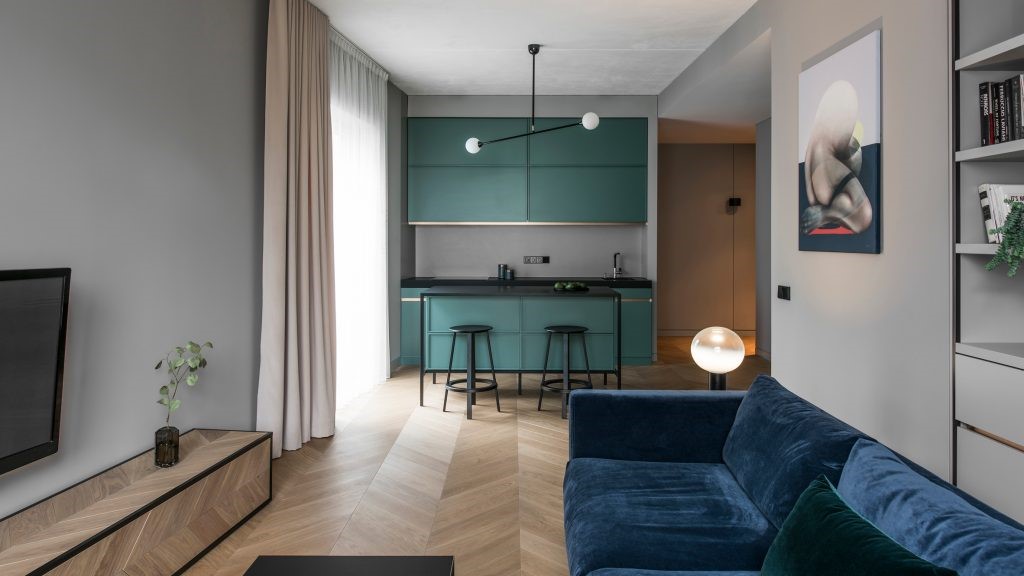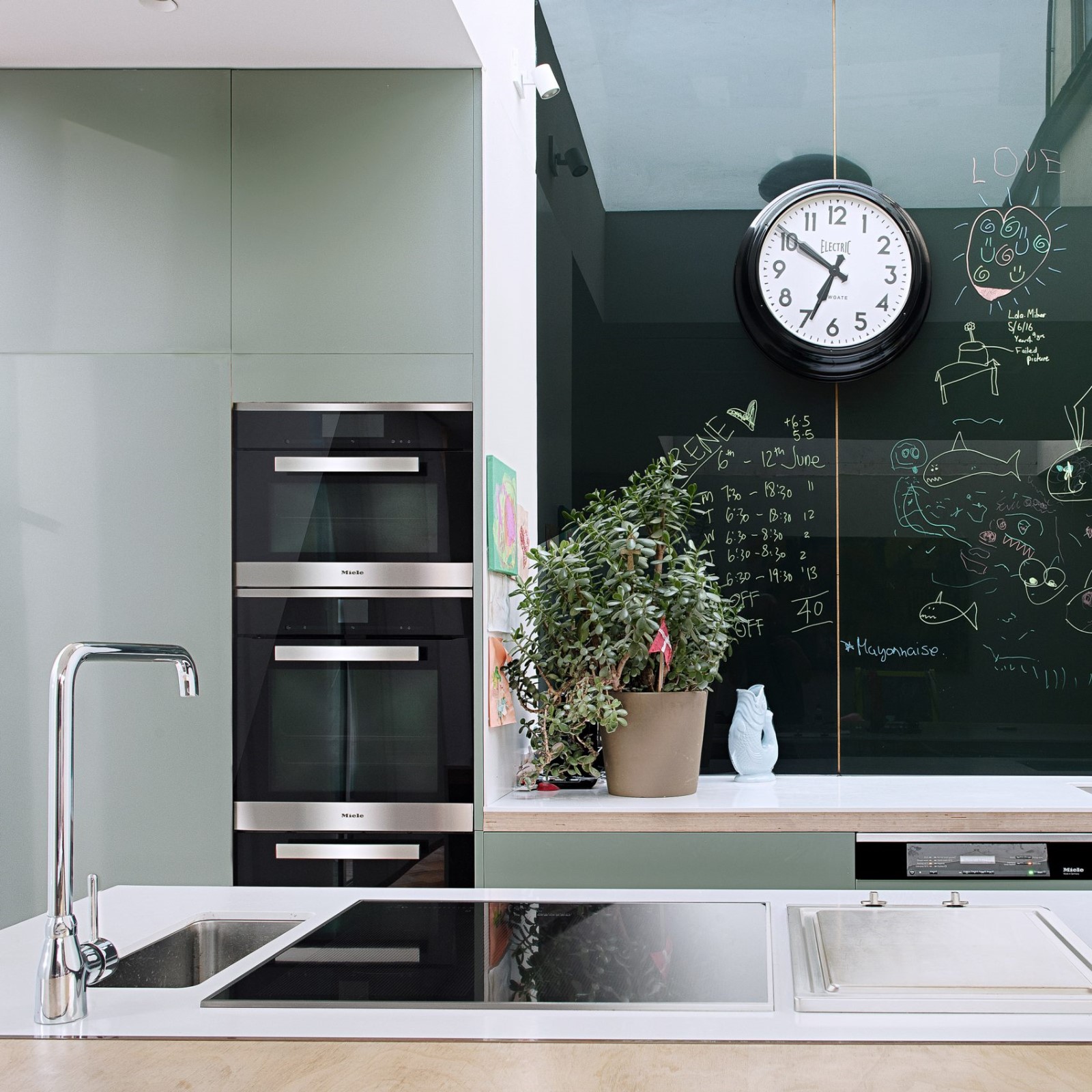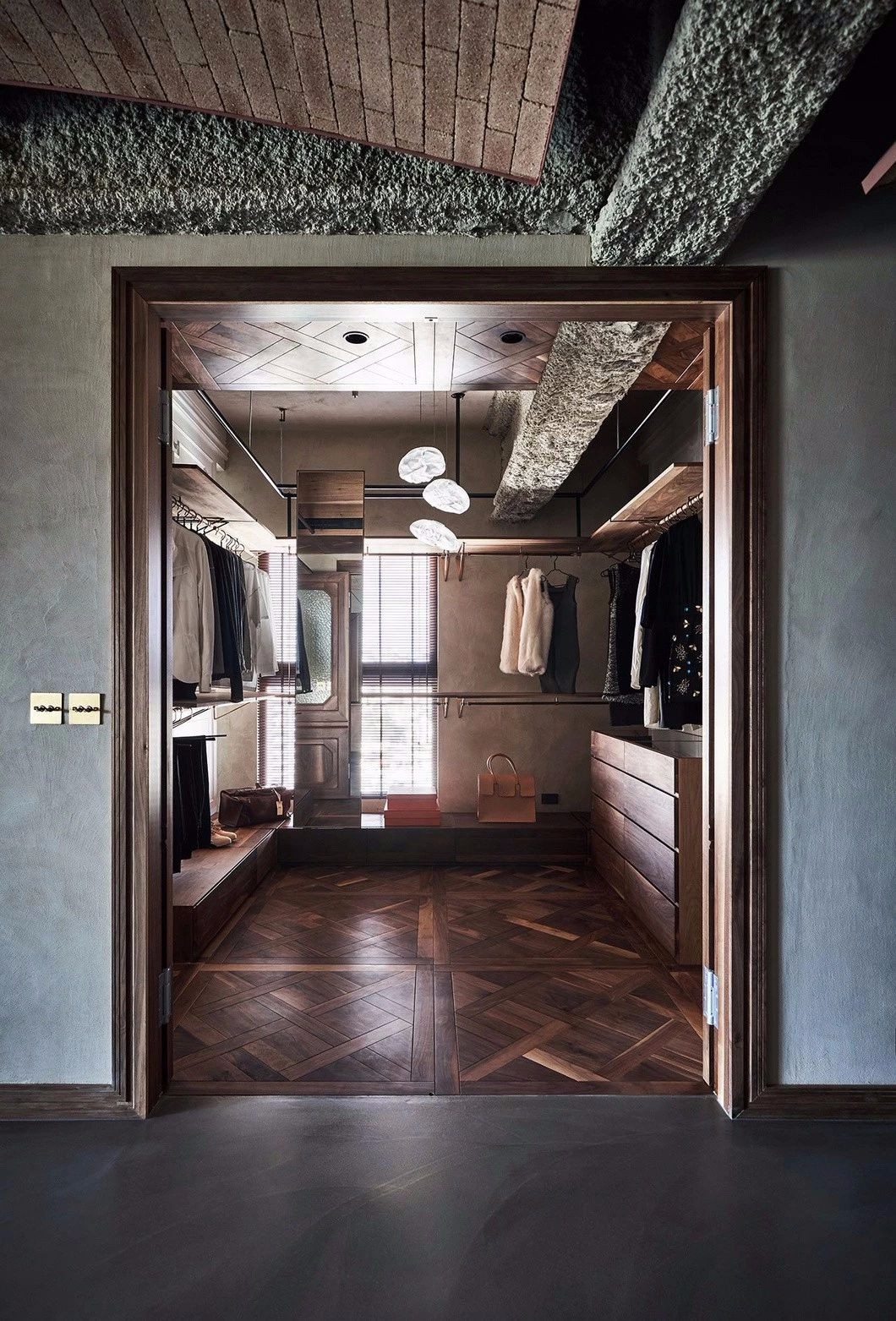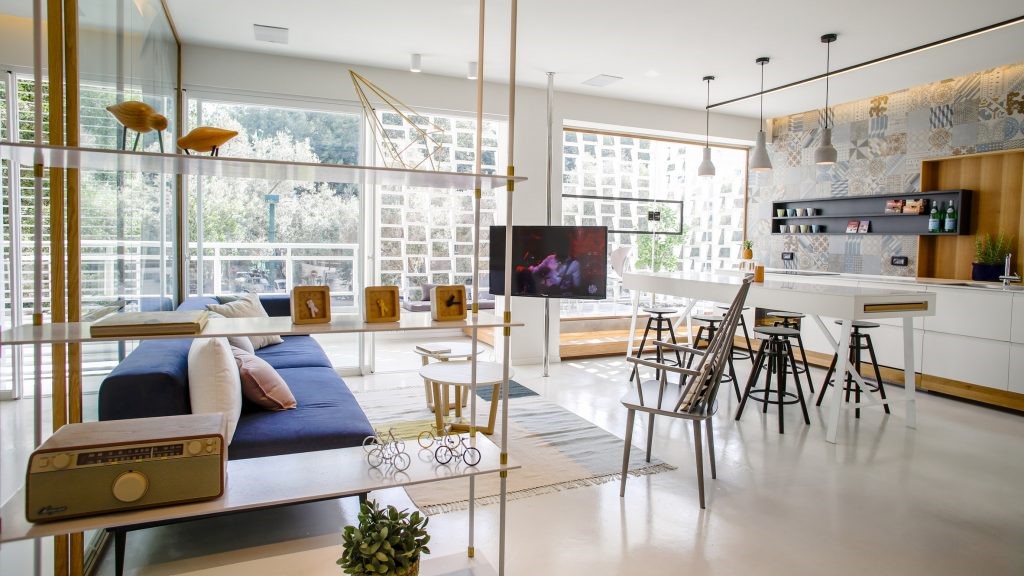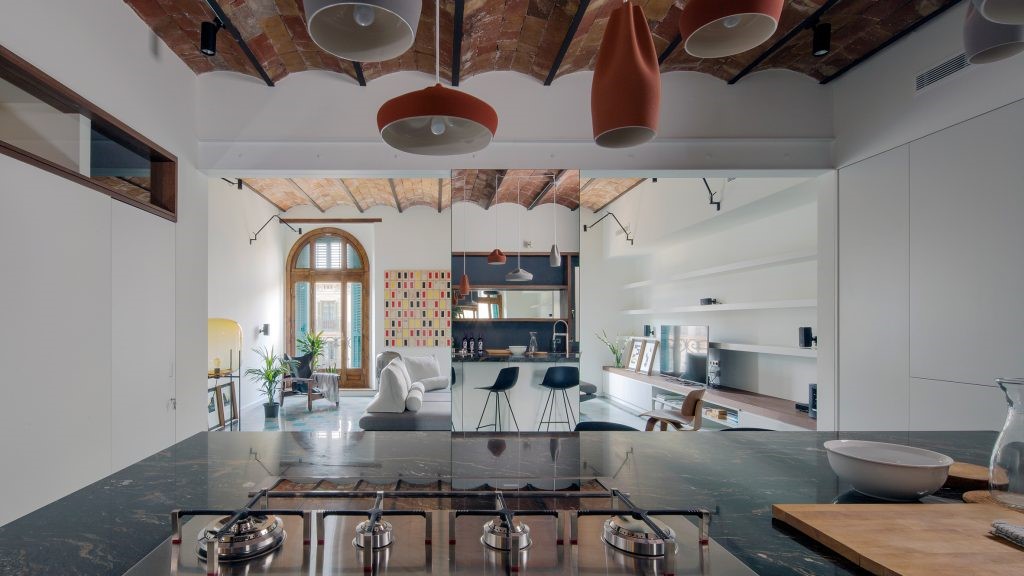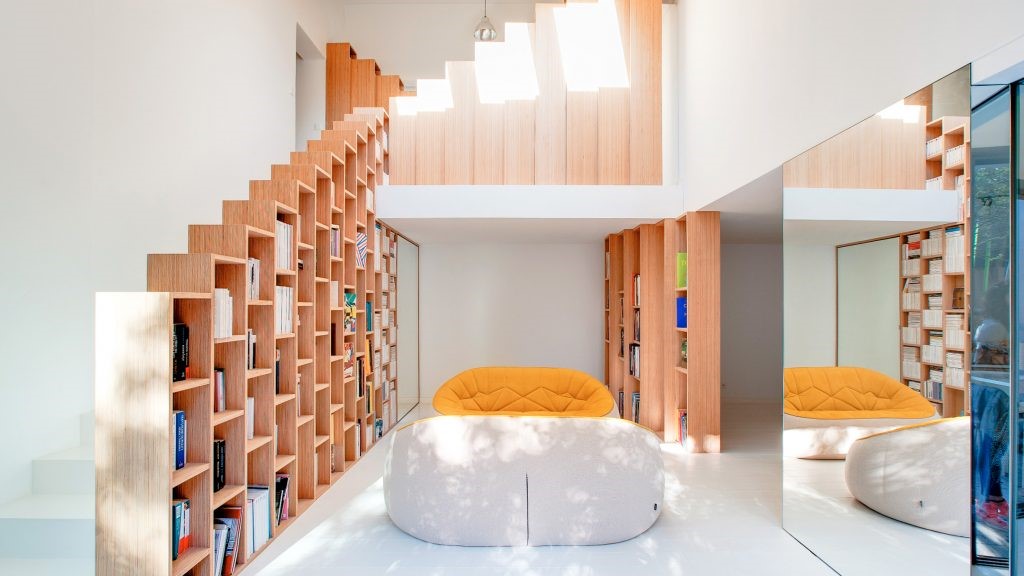Villa Ensemble AFGH
2016-03-21 03:00
© Valentin Jeck
c.Valentin Jeck


架构师提供的文本描述。城市规划形势的选择,决定了一个宽敞的私人休憩空间是由一个背对建筑物,面向斜坡的轻倾斜和向东的相邻房屋所决定的。在分析最优视觉轴和有利点的基础上,考虑到特定概念的住宅的双面取向,对地面以上住宅的体积进行了定位。
Text description provided by the architects. Urban Planning The urban-planning situation was so chosen that a generous private open space was defined by the formation of a back to the building facing the light incline of the slope and the neighbouring house to the East. The positioning of the volumes of the residential buildings above ground level is based on an analysis of the most optimal visual axes and vantage points, taking account of the concept-specific double-sided orientation of the houses.
© Valentin Jeck
c.Valentin Jeck


这两座建筑的离散多边形体积是视觉隐私思想和优势点的结果,它们的倾斜屋顶构成了一个单一的实体。凹和凸凹进入与外部空间的对话,产生明确的定义和包围的空间来放松。
The discreet polygonal volumes of the two buildings are the result of ideas of visual privacy and vantage points, and with their slanted roofs they constitute a single entity. The concave and convex recesses enter into a dialogue with the exterior space, producing clearly defined and encompassed spaces to relax.
© Valentin Jeck
c.Valentin Jeck


一种雕塑的品质产生,使建筑物具有可塑性和一定的轻盈性。因此,建筑的形式和表现形式都是为了实现语境和形式两个方面。
A sculptural quality is generated, lending the buildings plasticity and a certain lightness. The form and the expression of the buildings therefore aim to fulfill both contextual and formal aspects.


立面的布置遵循同样的原则。所涉及的概念不是有屋顶的房屋,而是建筑形状,其中屋顶表面代表“第五”正面。
The arrangement of the facades follows the same principles. The concept involved is not one of houses with roofs, but rather of building shapes in which the surfaces of the roofs represent a “fifth” facade.
© Valentin Jeck
c.Valentin Jeck


该委员会包括用通过地下健康区相互连接的两所单一家庭住房取代现有的双独户住房。两座房子都是通过一条穿过花园的小径到达的,这条小径将两个外部层次连在一起。
The commission consisted of replacing the existing double single-family houses with two single-family houses connected to each other via an underground wellness area. Both houses are reached by a footpath through the garden that connects the two exterior levels to each other.
© Valentin Jeck
c.Valentin Jeck


一座“长廊建筑”从天窗下的共用地下车库通向房屋的每个垂直循环核心。每一层的入口区域统一了内部和外部通道。平面图的多边形形式使空间分布有了区别。这意味着生活区被布置在正交组织的环流核心周围。
A “promenade architecturale” leads from the shared underground garage on beneath skylights to each of the vertical circulation cores of the houses. The entrance areas in each of the ground floors unite the internal and external access routes. The polygonal form of the floor plan enables a differentiated spatial distribution. This means that the living areas are arranged around the orthogonally organised circulation cores.


这些正交结构之间的房间和立面的折叠级数形成了一个空间连续体,一直延伸到上层。
The rooms between these orthogonal structures and the folded progression of the facade form a spatial continuum that extends onwards to the upper storeys.
© Valentin Jeck
c.Valentin Jeck


双层起居室构成了住宅的主要空间焦点。其他房间从它们周围的循环核心向外发展,这是由一个开放的壁炉加强。
The double-storey living rooms form the main spatial focuses of the houses. The other rooms develop outwards from them around the circulation cores, which are enhanced by an open fireplace.
Floor Plan


主要区域安排在两个屋顶水平,包括一个步入式衣柜,一个大型浴室和直接进入屋顶露台。外部空间被设置在框架中,将景观-西面到森林,南到苏黎世湖。
The master areas arranged at both roof levels include a walk-in wardrobe, a large bathroom and direct access to the roof terrace. The exterior spaces are set in the framework, mounting the views – to the West of the site to the woods, and to the South out over Lake Zurich.
这两所房子在不同的排列方式和不同的情况下的卷。
The two houses differ in terms of the contrasting alignments and situations of the volumes.
© Valentin Jeck
c.Valentin Jeck


进一步的地下连接两卷通过健康地区。核心区域与游泳池平行延伸,包括更衣室、浴室/厕所、蒸汽浴室和桑拿浴室。15米长的游泳池周围的出入区域为甲板椅、重量和健身机器提供了空间。在地下健康区的一个重要因素是进入花园区,给空间一个意想不到的扩展。
A further underground connection to the two volumes leads through the wellness area. The core zone stretches parallel to the swimming pool and contains a dressing room, bathroom/WC, a steam bath and a sauna. The access area around the 15-metre-long pool provides space for deckchairs and weight and fitness machines. An important element in the subterranean wellness area is the access to the garden area, giving the space an unexpected expansiveness.
建筑/物化这两座建筑都是从共用的地下车库和健康水平上提高的。地面以下的实心混凝土结构被钢筋混凝土的承重框架所取代,该框架由木制构件和窗户填充。
Construction / Materialization Both buildings rise from the shared underground garages and the wellness level. The solid concrete construction beneath ground level gives way to a load-bearing framework of reinforced concrete, which is filled in with wooden elements and windows.
© Valentin Jeck
c.Valentin Jeck


灰木素与光滑的混凝土表面形成对比。立面的结构遵循一种代谢性的方法,木质和窗户元素可以根据需要用玻璃代替。大部分的内墙都是用白色的灰泥做的,而垂直的循环芯和壁炉则显示出暴露的混凝土。
The ash-wood elements contrast with the smooth outer concrete surface. The structure of the facade follows a metabolic approach whereby the wooden and window elements can be replaced as wished with glazing. The majority of the inside walls are executed in white plaster, whilst the vertical circulation core and the fireplaces reveal the exposed concrete.
© Valentin Jeck
c.Valentin Jeck


从外部看,个别建筑的形状就像巨石,而内部则是由高质量、精致的材料所主导的。作为一个整体,其目的是创造一种空间氛围,以自然材料为特征,散发出舒适和舒适,但没有前面的现代的,当代的建筑外观。
From the outside the individual building shapes appear like boulders, whereas the interiors are dominated by high-quality, refined materials. As a whole the aim was to create a spatial atmosphere characterised by natural materials that radiate comfort and cosiness, but without foregoing a modern, contemporary architectural appearance.






































































Architects AFGH
Location Switzerland
Category Houses
Project Year 2014
Photographs Valentin Jeck


















